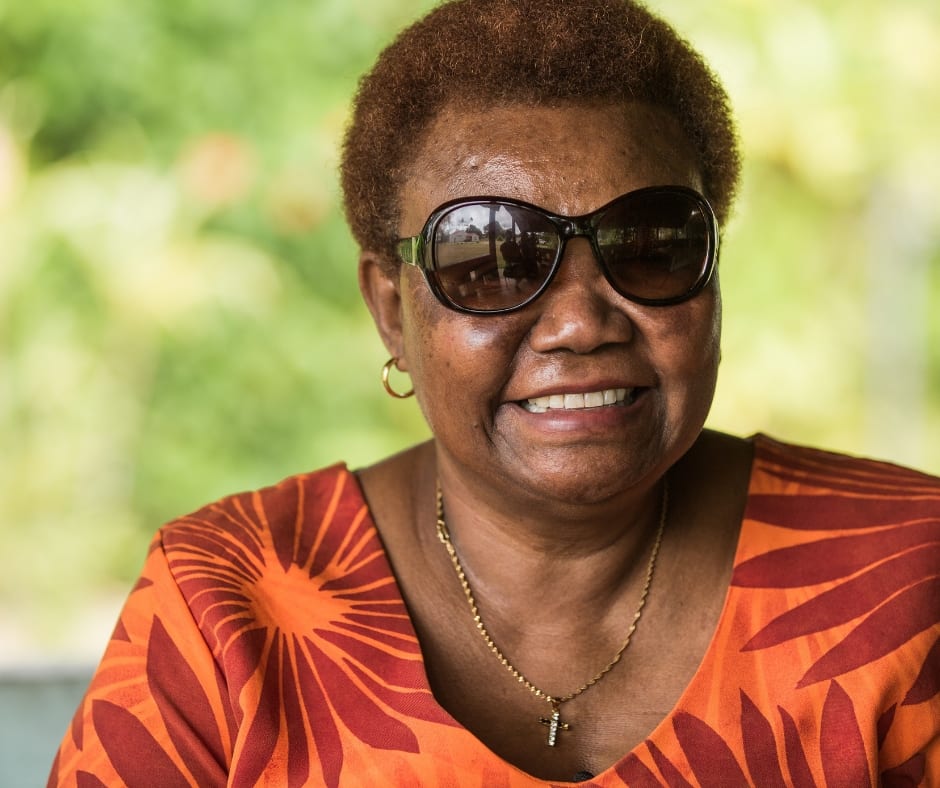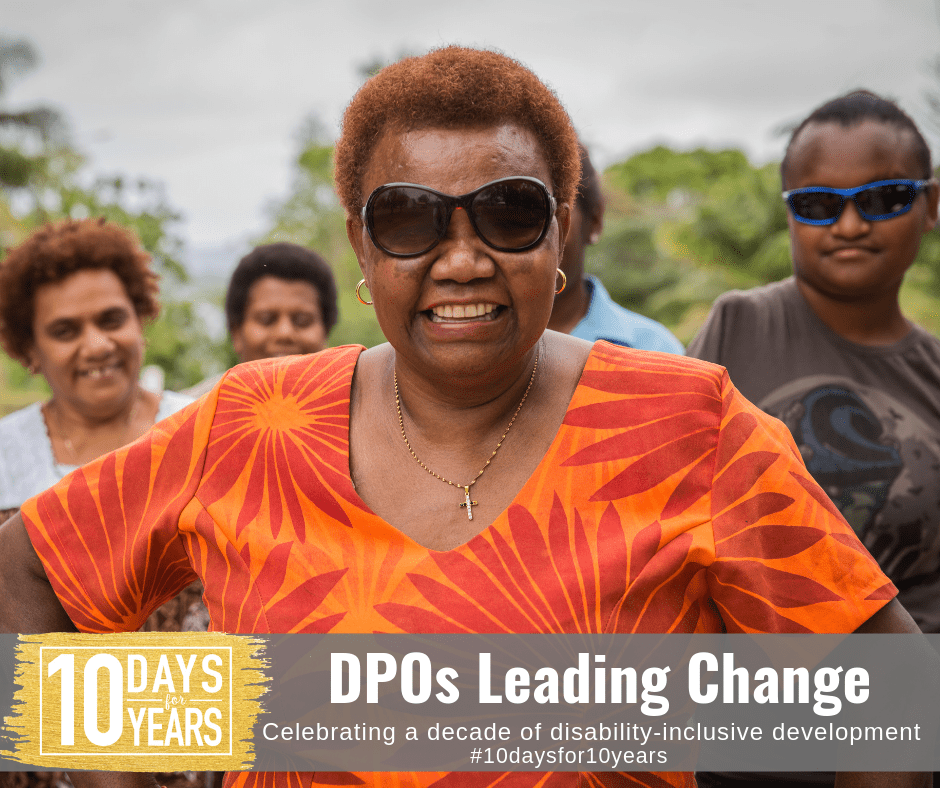Disabled People's Organisations Leading Change
The catchcry ‘nothing about us without us’ has heralded the arrival of disability rights activists for decades. Once shouted at rallies, it is now embedded in strategies – including DFAT’s Development for All strategy for disability-inclusive development.
Both the 2009 and 2015 strategies have affirmed support for the active and central role of people with disabilities as the first, and most important, guiding principle. To put this into action, the active involvement of disabled people’s organisations (DPOs) in the planning, implementation, and monitoring and evaluation of Australian aid investments has been embedded as a measure of inclusion in DFAT’s Aid Quality Check process.
For some partners in delivering Australian aid, working with DPOs has become ‘the new normal’: they have embedded ways of working which include facilitating partnerships between DPOs, development organisations and governments; supporting DPOs to select how and when they will (or won’t) engage; and prioritising capacity building to yield mutual benefit.[1] A recent Office of Development Effectiveness evaluation of the Development for All strategy found that the importance of such capacity development approaches ‘cannot be overstated.’[2]
But for many others, there is still some way to go. At a 2018 Senate Estimates hearing, DFAT revealed that the percentage of Australian aid investments reporting ‘satisfactory’ DPO engagement was in decline: from 53% in 2015-16 to 42% in 2016-17.[3]
The value of involving DPOs reaches well beyond compliance.
‘It was challenging for me at first because I lacked the proper knowledge, skills, experience and support needed to do advocacy’, commented Nelly Caleb, Director and National Coordinator of the Vanuatu Disability Promotion & Advocacy Association (VDPA). ‘However, with the passion I had for giving a voice to people with disabilities, I felt motivated to carry out the role and ensure that their rights and voices were being heard, recognised and valued in our communities.’[4]
With operational support funded through the Australian aid program, VDPA is the national DPO of Vanuatu with the mission of advocating for the rights and promote the abilities of persons with disabilities in Vanuatu. Through developing the capacity of their members to be advocates and maintaining strong working relationships with various levels of government, VDPA has worked to put disability on the local, national and regional agendas.

VDPA is far from alone in its mission: across the scattered islands of Vanuatu, other DPOs and civil society organisations working to advance the rights of people with disabilities have gathered under the umbrella of the Vanuatu Civil Society Disability Network (VCSDN). VSCDN provides a forum for member organisations to collectively enhance and unite their advocacy messages for a more inclusive society. Through increasing representation of disability issues to different levels of government decision making, VCSDN has had considerable success in influencing policy and practice to include and address the needs of people with disabilities.
With capacity development support provided with funding from the Australian aid program, VCSDN has developed the skills and profile of a number of ni-Vanuatu DPO leaders and disability rights spokespeople. As a result, local leaders have been consulted by different levels of government on issues ranging from disability perspectives in town planning, to national policies for sign language development, to the priorities and action agenda for the Vanuatu National Sustainable Development Plan. Not limited by national boundaries, VCSDN and its members have also provided input into international human rights conventions and processes, including the Convention on the Elimination of all Forms of Discrimination Against Women, and the first ever Charter on Inclusion of Persons with Disabilities in Humanitarian Action. As Nelly described the mission of VCSDN, ‘We can give services but without advocacy we will never change things for the long term in a sustainable way’.[5]
‘Nothing about is without us’ must continue to be heard and honoured as a rallying cry across the international development sector.’
As a well-known local advocate, Nelly has also personally transformed the way her community, country and region views the capacity and strength of a person with disability. ‘Nothing about is without us’ must continue to be heard and honoured as a rallying cry across the international development sector. To ensure people with disabilities are included as true partners—rather than just beneficiaries—of development, aid programs need to continue to support DPOs through capacity development and adequate resourcing. In doing so, programs will not only reach, but include and empower, people with disabilities in the communities in which they are working.
For advocates like Nelly, the work is far from over. While there have been many positive changes in Vanuatu regarding the recognition and treatment of people with disabilities, some practices and past beliefs continue to negatively affect roles of people with disabilities across the country. Through VDPA and VCSDN, she will be a part of continuing to break these barriers, identifying needs and advocating for change.
Story in partnership with Vanuatu Disability Promotion & Advocacy Association and images of Nelly Caleb copyright to Erin Johnson/CBM Australia.
References
[1] CBM Australia, 2018. Statement of approach – Working with the disability movement through people with disabilities and their representative organisations. Available from here.
[2] Office of Development Effectiveness, 2018. Development for All: Evaluation of Progress Made in Strengthening Disability Inclusion in Australian Aid. DFAT, Canberra. p. 57.
[3] See Department of Foreign Affairs and Trade, 2017. Performance of Australian Aid 2015-16. DFAT, Canberra. p. 94; and Department of Foreign Affairs and Trade, 2018. Written response to question on notice no. 83, available from here.
[4] Oxfam and Vanuatu Civil Society Disability Network, 2017. Stories of Change: Nothing About Us Without Us. Oxfam in Vanuatu, Port Vila. p. 29.
[5] Ibid. p. 29.
Sign up to receive the daily campaign article:
By signing up you will receive a daily email from the 10 days for 10 years campaign between 29 April to 10 May 2019.
10 days for 10 years
In partnership with CBM Australia and other ADDC partner organisations, the 10 days for 10 years campaign runs from 29 April to 10 May 2019. The campaign is celebrating the achievements in disability-inclusive development (DID) within the Australian aid sector, particularly those led or made possible by Australian aid under the first and second Development for All strategies. Articles will be released daily here on the ADDC website.
Follow the campaign via the hashtag #10daysfor10years and follow @ADDCnews on Twitter, Facebook and LinkedIn.
- 10 days for 10 years
- Day 1 – A Legacy of Leadership
- Day 2 – Beyond the Mainstream
- Day 3 – Inclusion at the Intersection
- Day 4 – Disabled People’s Organisations Leading Change
- Day 5 – Recognising Diversity within Disability
- Day 6 – Reporting from the Shadows
- Day 7 – Volunteering for Inclusion
- Day 8 – Evolution of Inclusion
- Day 9 – Education for All
- Day 10 – Building on Success

